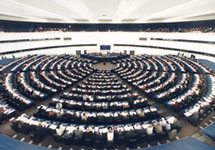Microsoft accused of 'abusive behaviour' in server market by the EU
As its market share continues to grow, Microsoft is threatened with new fines by the EU's competition commissioner

Neelie Kroes, the European Union's (EU's) competition commissioner, has again threatened Microsoft with heavy fines for failing, in her opinion, to meet its obligations under the 2004 ruling that it must disclose details of protocols that would enable products from other companies to interoperate with its workgroup servers.
The commissioner's renewed concerns were prompted by statistics that showed that Microsoft's share of server market has risen to 75 per cent.
In 1999, when the European Commission began its investigation, that figure stood at between 35 and 40 per cent, rising to 60 per cent by 2004.
"Microsoft is constantly gaining market share and that is what is worrying me in the work group server operating market," she told the European Parliament.
"As a consequence of your abusive behaviour you are getting positive results for the company - that's not acceptable in my opinion."
Since the ruling was made, the commission has rejected several submissions that Microsoft believed fulfilled the ruling's requirements.
Earlier this month, it announced that Quest was the first company to license the latest published version of the protocols, but Kroes said that the terms of the licence were unacceptable, as Microsoft was charging a fee for technologies that it had not developed itself. The commission's position is that it may only charge for protocols that are innovative.
Get the ITPro daily newsletter
Sign up today and you will receive a free copy of our Future Focus 2025 report - the leading guidance on AI, cybersecurity and other IT challenges as per 700+ senior executives
Microsoft says that all the protocols contain valuable intellectual property and maintains that it should be entitled to charge for them.
"Other government agencies in both the United States and Europe have already found considerable innovation in Microsoft's protocol technology," Microsoft's general counsel Brad Smith said recently.
"US and European patent offices have awarded Microsoft more than 36 patents for the technology in these protocols, which took millions of dollars to develop, and another 37 patents are pending, so it's hard to see how the commission can argue that even patented innovation must be made available for free."
Microsoft is appealing the 2004 ruling.
-
 Cleo attack victim list grows as Hertz confirms customer data stolen
Cleo attack victim list grows as Hertz confirms customer data stolenNews Hertz has confirmed it suffered a data breach as a result of the Cleo zero-day vulnerability in late 2024, with the car rental giant warning that customer data was stolen.
By Ross Kelly
-
 Lateral moves in tech: Why leaders should support employee mobility
Lateral moves in tech: Why leaders should support employee mobilityIn-depth Encouraging staff to switch roles can have long-term benefits for skills in the tech sector
By Keri Allan